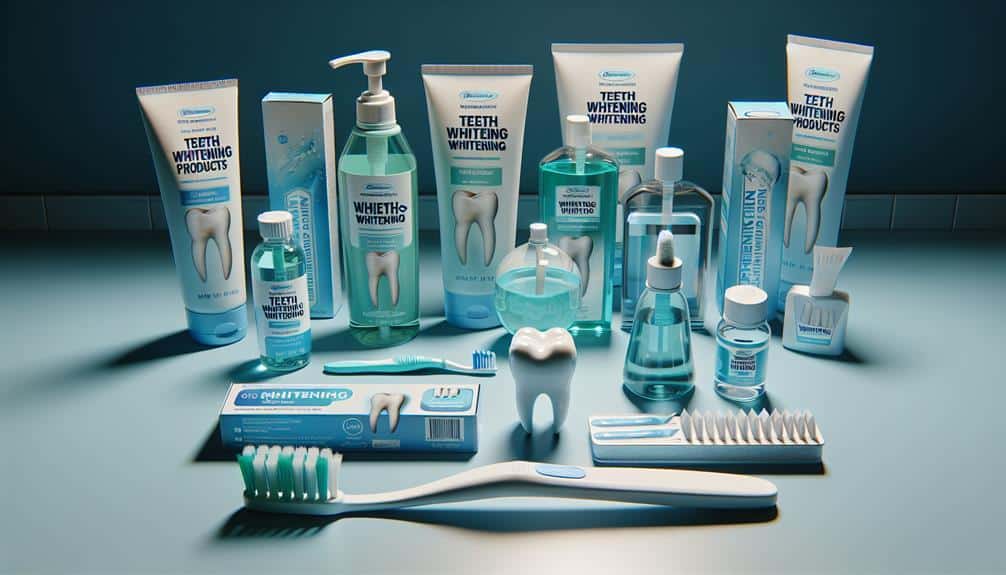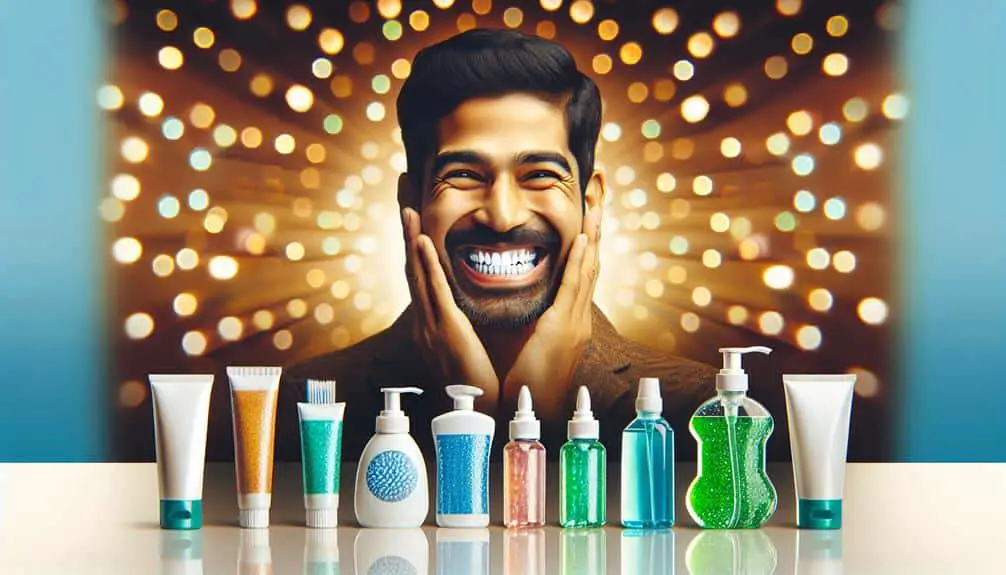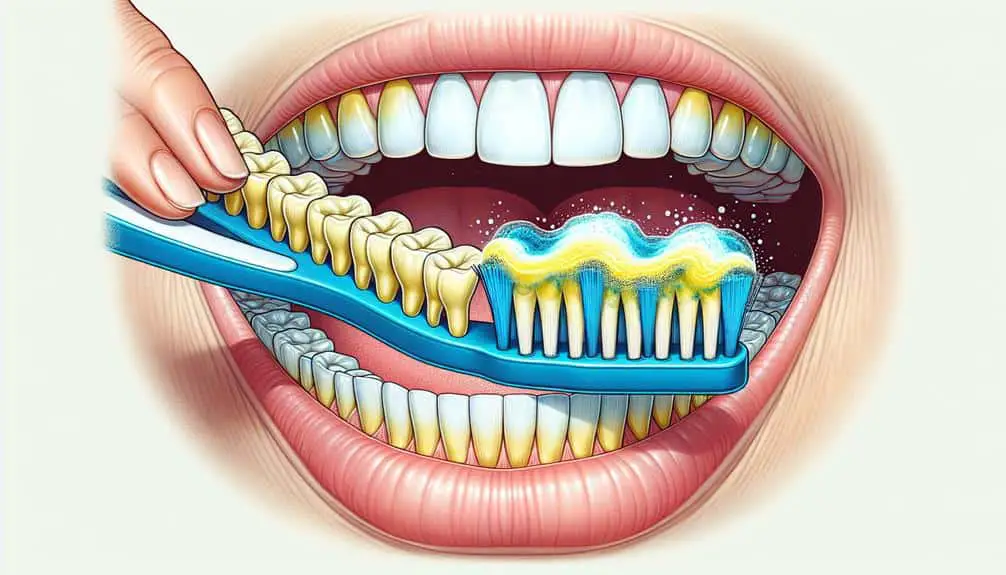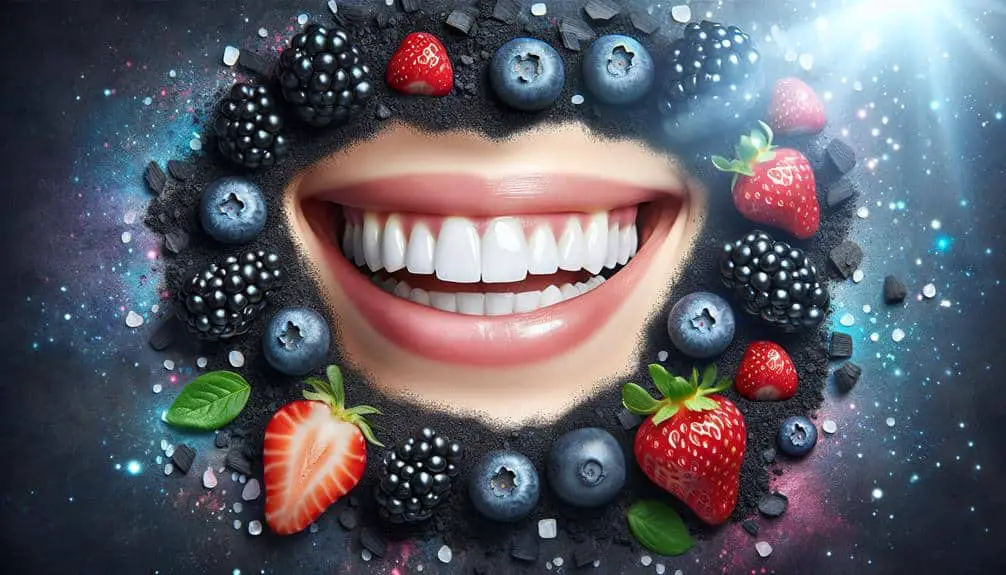Teeth whitening products break down fluoride stains on your teeth, restoring their natural shine. The whitening agents in these products penetrate your enamel to target and remove stains beneath the surface. By using these products, you can effectively eliminate discoloration caused by fluorosis and enhance the overall appearance of your smile. The chemical reactions in whitening products work to improve the aesthetics of your teeth affected by fluoride discoloration. Discover more about how these products can help you achieve a brighter, whiter smile.
Key Points
- Whitening products break down fluoride stains chemically.
- They penetrate enamel to target deep-seated stains.
- Whitening agents effectively remove discoloration caused by fluoride.
- These products enhance the overall appearance of teeth.
- Regular use helps maintain a whiter smile over time.
Understanding Fluoride Stains on Teeth
If you've ever wondered why some teeth develop fluoride stains, it's crucial to understand the role of fluoride in causing discoloration. Fluoride stains on teeth are primarily caused by excessive exposure to fluoride during the tooth development stage. This typically occurs in children under the age of 8 when their permanent teeth are still forming. When ingested in large amounts, fluoride can lead to a condition called dental fluorosis, which manifests as white or brown stains on the teeth.
Prevention of fluoride stains involves monitoring fluoride intake, especially in children. This includes using fluoride-free toothpaste for young children who are more prone to swallowing toothpaste. Additionally, regulating the amount of fluoride in drinking water and being cautious with fluoride supplements can help prevent dental fluorosis.
It's crucial to consult with a dentist to determine the appropriate fluoride levels for your family's oral health needs. By being mindful of fluoride intake, you can significantly reduce the risk of developing fluoride stains on teeth.
How Teeth Whitening Works on Stains
Teeth whitening products work by targeting and removing stains on the surface of your teeth, revealing a brighter and whiter smile. When you use these products, here's how they work on stains:
- Chemical Reactions: The active ingredients in whitening products, such as hydrogen peroxide or carbamide peroxide, undergo chemical reactions with the molecules that cause discoloration on your teeth. These reactions break down the stains, making them less visible and brightening your smile.
- Enamel Penetration: The whitening agents in these products can penetrate the enamel of your teeth. They work their way into the pores of the enamel and target the stains beneath the surface, effectively lifting them and improving the overall appearance of your teeth.
- Stain Removal: By effectively targeting and breaking down the stains on your teeth, whitening products help remove discoloration caused by various factors like food, beverages, and smoking, giving you a renewed confidence in your smile.
Benefits of Using Whitening Products
When considering the benefits of using whitening products, it becomes evident how these solutions effectively target and eliminate stains on your teeth, enhancing the overall appearance of your smile. The cosmetic appeal of a bright, white smile can't be overstated. Whitening products not only remove discoloration caused by factors like fluoride but also provide a confidence boost by giving you a radiant smile that you can be proud of.
Moreover, the long-term benefits of using whitening products are worth noting. By incorporating these products into your dental care routine, you can maintain a whiter smile over an extended period. However, it's essential to understand the maintenance requirements associated with whitening treatments. Regular use of whitening toothpaste or touch-up treatments can help prolong the effects of the initial whitening process, ensuring that your smile remains vibrant and stain-free.
Embracing whitening products can lead to not just a temporary fix but a sustained enhancement in the appearance of your teeth.
Tips for Safely Whitening Discolored Teeth
To safely whiten discolored teeth, it's important to first consult with your dentist to determine the most suitable whitening method for your specific needs and oral health condition. Here are three essential tips to help you effectively whiten your teeth while maintaining oral health:
- Preventing Discoloration: To maintain your newly whitened teeth, it's vital to avoid habits that can lead to discoloration such as smoking, consuming staining foods and drinks like coffee or red wine, and practicing good oral hygiene habits like brushing and flossing regularly.
- Natural Remedies: Consider incorporating natural remedies like baking soda, hydrogen peroxide, or activated charcoal into your oral care routine under the guidance of your dentist. These natural alternatives can help whiten teeth gently over time.
- Regular Dental Check-ups: Schedule regular dental check-ups to monitor the progress of your whitening treatment and make sure that your teeth and gums remain healthy throughout the process. Your dentist can provide personalized advice and adjustments to your whitening plan as needed.
Results and Expectations From Whitening
For best results and a clear understanding of the whitening process, it's essential to manage your expectations and follow the guidance provided by your dental professional. When considering whitening duration and effectiveness, it's important to recognize that the results can vary based on the type of whitening treatment chosen. Professional whitening treatments conducted in a dental office tend to show quicker and more noticeable results compared to at-home whitening kits. Professional whitening procedures often use higher concentrations of whitening agents, leading to faster and more effective outcomes.
Typically, professional whitening treatments can provide visible results after just one session, with the full extent of whitening achieved within a few appointments. On the other hand, at-home whitening kits may take longer to show noticeable changes, and the effectiveness can vary depending on the product used and adherence to the instructions provided. Understanding the differences in whitening duration and effectiveness between professional and at-home treatments can help establish realistic expectations and ensure a successful whitening outcome.
Frequently Asked Questions
Can Teeth Whitening Products Completely Remove Fluoride Discoloration From Teeth?
Teeth whitening products differ in whitening effectiveness for fluoride discoloration. Some may lighten stains, but complete removal may be challenging. Stubborn stains might require professional treatment options like in-office whitening or veneers for best results.
Are There Any Long-Term Negative Effects of Using Teeth Whitening Products on Fluoride Stains?
When using teeth whitening products on fluoride stains, consider the long-term effects for children's safety. While effective, prolonged use may weaken enamel. Consult a dentist for guidance on maintaining oral health while addressing discoloration.
How Do Fluoride Stains on Teeth Affect Overall Dental Health?
Fluoride stains on teeth can impact dental health by weakening enamel and causing discoloration. Prevention involves proper fluoride use and regular dental check-ups. Understanding fluoride risks is essential for maintaining top-notch oral hygiene and preventing long-term dental issues.
Can Children With Fluoride Stains on Their Teeth Safely Use Teeth Whitening Products?
In the domain of child safety, teeth whitening can be a concern for parents. Understanding the impact of fluoride stains and the effectiveness of whitening products is essential. Guarantee proper guidance from a dental professional.
Are There Any Natural Remedies That Can Help Reduce Fluoride Discoloration on Teeth?
To reduce fluoride discoloration on your teeth, consider natural remedies and DIY methods. Options like oil pulling, baking soda paste, and hydrogen peroxide rinses may help diminish stains. Consult with a dentist for personalized advice.



